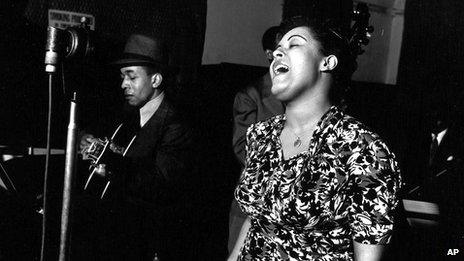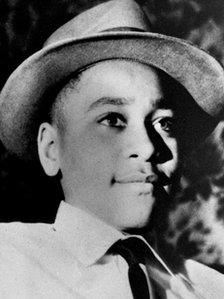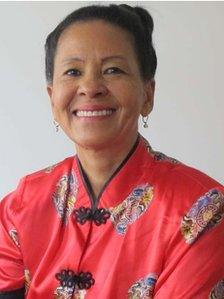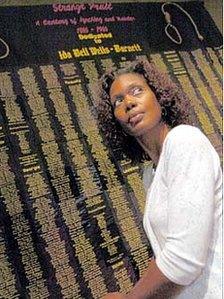Strange Fruit: A protest song with enduring relevance
- Published

A photographer captured Billie Holiday singing Strange Fruit as she recorded the song in 1939
First recorded in 1939, the protest song Strange Fruit came to symbolise the brutality and racism of the practice of lynching in America's South. Now, more than seventy years later, such is the song's enduring power that rapper Kanye West sampled the track on his latest album Yeezus.
"The smell of the honeysuckle brings all of it back. That's the smell prevalent in the area we lived in. The honeysuckle was in bloom.
"Because words can't describe how we felt that night, how I felt. It was a combination of grief, shock, fear.
"You have a sorrow that grips you for what happened to Emmett."
The song was originally a poem about racism in America's Deep South
Simeon Wright, now in his seventies, is recalling the August night in 1955 in Mississippi when his 14-year-old cousin Emmett Till was dragged out of the bed they were sharing at Simeon's house.
He was taken outside at gunpoint by two white men, bundled into a truck and driven away.
It was the last time Simeon saw his cousin alive. Three days later, Emmett's body was found in the Tallahatchie River.
He had been beaten, tortured and shot before being dumped in the river.
The "crime" he had committed was to whistle at a white woman in the store she ran with her husband Roy Bryant in Money, Mississippi.
That cheeky - but innocent - gesture cost him his life at the hands of a lynch mob.
The case became famous in America and helped usher in the civil rights movement.
It also brought to a close an era of "extrajudicial authority" - or mob rule - that had been tacitly accepted for more than a century when lynch mobs carried out their own form of citizens' justice.
Lynch mobs tried and executed more than 5,000 mostly black men, women and children for a variety of misdemeanours.
Taboo subject
Emmett Till's murder and the photos that were published of his bloated disfigured body in an open coffin divided America but brought the taboo subject of lynching into the public domain.

Two white men were acquitted of the murder of Emmett Till
One of those who saw a photograph of Emmett is Sylvia Wong Lewis from New York.
She was eight or nine at the time and remembers innocently asking her father whether anything like that had ever happened in her family.
To her horror, her father replied, "Yes".
It was only years later, as an adult, that she discovered her great-uncle Warren had been accused of trying to assault a white woman.
He had been marched from jail in Ocean Springs, Mississippi by a group of 100 men to a persimmon tree a mile out of town where he was shot and strung up.
There was a reluctance within her family, she says, to discuss the lynching, making it hard for her to find out exactly what happened.
"They say the dog didn't bark when he went to her house," she reveals, inferring that they probably knew each other and that his killing was possible revenge for an affair between a black man and a white woman.
No grave
Newspaper reports from 1901 detail the "orderly and humane" lynching of a "negro brute" by the town's citizens.
These are the only remnants of his existence. There is no grave and there are no family photographs.

Sylvia Wong Lewis's great uncle was killed by a lynch mob
"Lynching was considered sport in some ways," says Robert Meeropol, "Postcards were taken of crowds of people picnicking under hanging bodies showing people who were proud of what they'd accomplished."
Meeropol is the adopted son of a Jewish schoolteacher, Abel Meeropol, who saw one of these postcards in the 1930s and was prompted to write the song Strange Fruit - later to be made famous by Billie Holiday.
Abel, who wrote under the name Lewis Allan, was a civil rights activist who adopted Robert and his brother after their parents, Ethel and Julius Rosenberg, were executed by the American government for being Communist spies in what Meeropol believed to be a "state-sponsored" lynching.
He wrote Strange Fruit as an attack on those who perpetrated it.
It was never a popular song, and certainly not among black communities or outside of progressive cities like New York.
Its subject matter was simply too painful and controversial.
'Sad song'
"It's such a sad song," says Sylvia "It's a metaphor for my uncle and so many other uncles, grandfathers, brothers and fathers who were lynched throughout America".
Billie Holiday made the song famous, but in 1939 her record label refused to allow her to record it.
She was released from her contract especially to record it.
It was the first time a black artist had sung such controversial lyrics. Atlantic Records founder Ahmet Ertegun called the song "a declaration of war… the beginning of the civil rights movement".
It has endured and become a symbol of the racism, cruelty, pain and suffering endured by so many in the United States. Other major artists, including Nina Simone, John Martyn, Sting and Robert Wyatt, went on to record it.
Billie Holiday's version eventually sold more than a million copies. In 1999, Time magazine voted Strange Fruit the Song of the Century.

April Shipp has sewn the names of 5000 people who were lynched onto a memory quilt
Bob Dylan cites the song as a personal inspiration. It has inspired books, an opera and continues to be recorded today.
This year India Arie included a version of the song on her album Songversation and Kanye West used a sample of Nina Simone's version of the song in his track Blood on the Leaves.
"That strange fruit is still out there, just in a different form," says Simeon Wright, who believes racism against young black men is still all too prevalent in American society.
He left Mississippi after Emmett's death and now lives in Chicago, where he joined the church and devoted much of his life to working with deprived black youths.
April Shipp is a quilt-maker from Detroit. She spent four years working on a large quilt called Strange Fruit.
It bears the names of over 5,000 lynched men, women and children, each one lovingly sewn in gold thread on black fabric.
She even included two nooses. "I cried every day I worked on it," April says, "I call it my 5,000 souls and I still cry when I touch it, but if no-one else remembers their names, I remember them. I stand for these people."
After being told about Sylvia's uncle, April offered to look for his name on her quilt, finding him a couple of hours later under the Mississippi section.
She took photos so that Sylvia could see his name.
After receiving the pictures, Sylvia replied "Thank you, thank you. There is something so comforting knowing he is remembered on a quilt, a bed-cover for the weary."
For Sylvia, April and Simeon, Strange Fruit remains a potent reminder of America's not-so-distant past.
Soul Music is on BBC Radio 4, 26 November, 11:30 GMT.
- Published23 July 2013
- Published23 July 2013